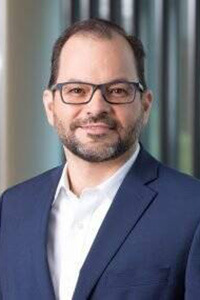2023 International Mental Health Research Symposium Presentations
On October 27, 2023, we held our International Mental Health Research Symposium.
On October 27, 2023, we held our International Mental Health Research Symposium.
Donations are welcome

Professor and Chair, Department of Psychiatry
UC San Diego Health
Scientific Council Member (Joined 2017)
2008 Independent Investigator Grant
2006, 2004 Young Investigator Grant
Zafiris J. Daskalakis is a Professor and Chair of the Department of Psychiatry at the UC San Diego. He was formerly the Temerty Chair in Therapeutic Brain Intervention and Chief of the Mood and Anxiety Division at CAMH. His research involves the use of magnetic brain stimulation to study the role of cortical inhibition, plasticity and connectivity as potential pathophysiological mechanisms in schizophrenia, depression and obsessive compulsive disorder. Dr. Daskalakis also conducts treatment studies using repetitive transcranial magnetic brain stimulation (rTMS), magnetic seizure therapy (MST) and electroconvulsive therapy (ECT) for resistant symptoms in these disorders. He has received several national and international awards and distinctions including the Samarthji Lal Award in Mental Health Research from the Graham Boeckh Foundation for the top mid-career neuropsychopharmacology researcher in Canada in 2013. He also holds or has held NIMH and CIHR peer-reviewed funding and has also mentored numerous NARSAD Young Investigator awardees.

Assistant Professor, Department of Psychology
University of Denver
2019 Young Investigator Grant
Kimberly Chiew, Ph.D. is an Associate Professor of Psychology at the University of Denver and director of the Motivation, Affect, & Cognition Lab. She earned her Ph.D. in Psychology from Washington University in St. Louis and completed a postdoctoral fellowship in the Center for Cognitive Neuroscience at Duke University. Dr. Chiew’s research combines behavioral, psychophysiological, and neural approaches to characterize how emotional and motivational influences modulate cognitive performance, with a particular focus on cognitive control and memory encoding outcomes, and how these relationships can change with development and psychopathology. Dr. Chiew has been recognized as a Rising Star by the Association for Psychological Science and has received research and fellowship support from the National Institute of Mental Health, Brain and Behavior Research Foundation, National Sciences & Engineering Research Council of Canada, and the Canadian Institutes of Health Research.
Attention-deficit/hyperactivity disorder (ADHD) is a widely pervasive neurodevelopmental condition characterized by inattention, hyperactivity, and impulsivity, contributing to difficulties in everyday activities. While ADHD has traditionally been considered a difference in cognition, motivational alterations have also been implicated in both theoretical and experimental models of ADHD. In this talk, Dr.

Associate Professor of Psychiatry and Psychology
Associate Director of Translational Research in Women’s Mental Health, Department of Psychiatry
University of Illinois Chicago College of Medicine
2018 Young Investigator Grant
A team of researchers has obtained encouraging results in a small pilot study testing a completely new way of treating major depression. The team was led by Francisco Romo-Nava, M.D., Ph.D., of the Lindner Center of HOPE and the University of Cincinnati College of Medicine, whose 2017 BBRF Young Investigator grant was devoted to research leading directly to the trial.

Associate Chief Research Officer
Lindner Center of HOPE
Assistant Professor, Department of Psychiatry and Behavioral Neurosciences
University of Cincinnati
2017 Young Investigator Grant
Dr. Romo-Nava is a Clinical Research Scientist studying the role of brain-body communication in the context of psychiatric disorders with a “Neuroscience of the Body” approach.
Dr. Romo-Nava is Associate Chief Research Officer at the Lindner Center of HOPE and Assistant Professor at the Department of Psychiatry and Behavioral Neurosciences at the University of Cincinnati. He graduated as MD at the Universidad Autonoma de San Luis Potosi, Mexico. He then completed his residency training in Psychiatry and a clinical fellowship in affective disorders at the National Institute of Psychiatry and the Universidad Nacional Autonoma de Mexico (UNAM). Dr. Romo-Nava then graduated with honors obtaining the PhD in Biomedical Sciences with a focus in neuroscience and hypothalamic integration mechanisms at the Institute for Biomedical Research at the UNAM. He then completed a postdoctoral fellowship at the Division of Bipolar Disorder Research in the Department of Psychiatry and Behavioral Neurosciences at the University of Cincinnati.
Philanthropic Support from the WoodNext Foundation Funds Grant Program for Senior-Level Psychiatric Researchers